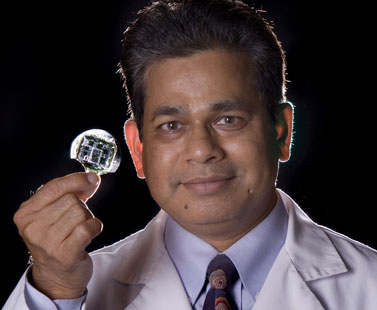American Academy of Allergy, Asthma & Immunology

USF Health’s Dr. Shyam Mohapatra Presents Research during American Academy of Allergy, Asthma & Immunology Conference.
Mohapatra’s Research: ‘Can a Skin Cream Prevent Asthma Attacks?’
On Friday, March 14th, before some 7,000 physicians and scientists worldwide, USF Health’s Shyam Mohapatra, PhD, FAAAAI, will present during the American Academy of Allergy, Asthma and Immunology Conference. Dr. Mohapatra will present during the plenary lecture of the 2008 conference being held in Philadelphia this week. His presentation will focus on a promising new way to treat allergic asthma by way of a skin cream.
Dr. Mohapatra is a Mabel & Ellsworth Simmons Professor of Allergy and Immunology in the USF Departments of Internal Medicine, Pediatrics and Molecular Medicine, and serves in a variety of leadership roles including Director of Basic Sciences in the USF Health Signature Program on Allergy, Immunology and Infectious Diseases (SPAIID).
He is the lead author on the research project he will present this week in Philadelphia and recently published in the on-line journal of “Genetic Vaccines and Therapy. The study asks the question “Can a skin cream ‘knock down’ your asthma?”. Mohapatra and a team of researchers from USF Health believe the answer is yes.
As the incidence of asthma and allergies continues to escalate all over the world, scientists struggle to find new ways of treating them. For decades, scientists have noted the difficulty in unlocking the secrets to asthma lies in the fact that there are no simple ‘cause and effect’ processes to follow. Experts agree that asthma is a complex disease.
Mohapatra and the team at USF Health have found a link between a well known heart hormone, atrial natriuretic peptide, better known as ANP, and the inflammation that occurs in lungs during asthmatic episodes. Pointing to this research study, USF Health researchers believe a key step in treatment is to block the signal sent out by ANP to receptors located on the surface of lung cells. During their research study, damage and elevated white blood cells in the lungs were prevented, when the ANP signal was blocked or “knocked down”.

Dr. Mohapatra holding a nanowire platform chip, which is part of the nanotechnology being used by USF Health researchers.
Among the exciting aspects of the study is the team’s use of nanotechnology and their delivery method – a skin cream. Dr. Mohapatra noted that because the nanoparticles are one hundredth the diameter of a cell, it easily passed through the skin and made their way to the lungs to block the ANP. The skin cream was rubbed on the backs of asthmatic mice in the study. The results showed that test mice treated in this way had lungs that were damage free and had no mucus.
Interviewed prior to his departure to Philadelphia, Dr. Mohapatra explained what this could mean down the road. “Sometimes it is difficult to treat asthma using conventional inhalers for children below 5 years of age and the elderly. Also, treatment by oral route has been found to be less compliant,” said Mohapatra, noting children and elderly asthmatics who are either unable to administer the correct dosage of medication or forget about taking their meds altogether. “Our research paper shows, for the first time, that even lung diseases such as asthma can be treated by a cream based delivery,” said Mohapatra who admits that, realistically, we are still several years away from having such a cream available to patients. “The therapy has to be translated from pre-clinical to clinical studies, which often takes upto five years.”
Dr. Mohapatra is the lead author in the study. Other authors of the study include Doctors Xiaoqin Wang, Subhra Mohapatra, Xiaoyuan Kong , and Richard Lockey from USF’s Department of Internal Medicine and Dr.Weidong Xu from TransGenex Nanobiotech.
Story by Lissette Campos, USF Health Communications.

